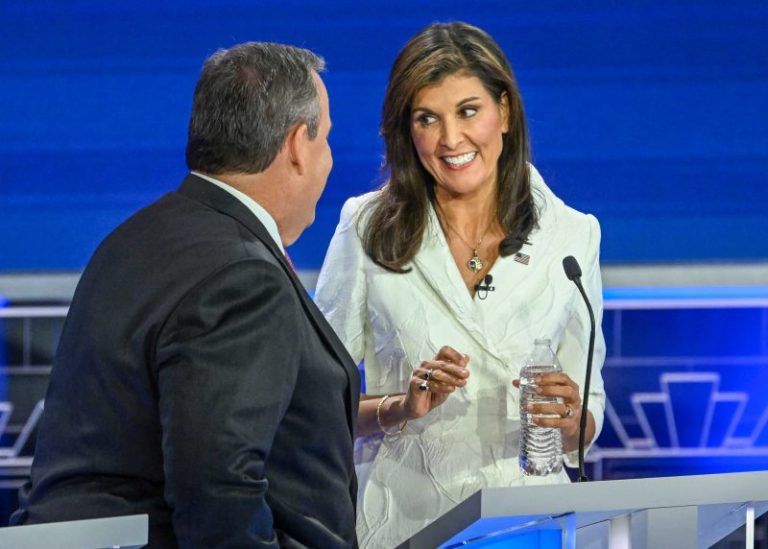A battery of recent New Hampshire polls has shown Nikki Haley and Chris Christie running second and third, respectively, in a state that could prove vital for what’s left of the GOP effort to stop Donald Trump.
This has led to some predictable chatter about Christie, the former New Jersey governor, dropping out in service of consolidating the anti-Trump vote, given he has long made clear that stopping Trump is high on his list of motivations. Christie, predictably, wants no part of such speculation.
“This idea of people just doing math and adding up numbers — that’s not the way voters vote,” Christie said this weekend on CNN. “And so I would say to everybody out there: Let’s let the campaign move forward.”
Christie has a point that you can’t just assume his supporters would go to Haley, the former South Carolina governor and ambassador to the United Nations. But the available evidence suggests that a large portion of them might.
And that could certainly assist Haley, though not necessarily enough to win New Hampshire — and not very much at all elsewhere.
The main reason to think voters could migrate from Christie to Haley is that, of the five major candidates left, these two largely monopolize the most middle-of-the-road, Trump-skeptical voters. That’s essentially Christie’s entire base of support, while Haley pulls largely but not exclusively from them.
A recent Washington Post-Monmouth University poll in New Hampshire showed them combining for around two-thirds of primary voters who described themselves as independents or Democrats and two-thirds who described themselves as moderate or liberal. Similarly, a recent CNN New Hampshire poll showed they combined for 9 out of 10 voters who say they voted for President Biden in 2020 — 20 percent of the electorate in the poll.
And Biden 2020 voters formed a substantial majority of Christie’s support; as many as 8 percent of New Hampshire GOP primary voters voted for Biden in 2020 and were now voting for Christie (out of his 11 percent overall). Given that Haley is the overwhelming choice of other Biden 2020 voters — she took 34 percent of such voters, while nobody else took more than 2 percent — she would seem the obvious alternative for that 8 percent and those like them.
Another recent Washington Post poll also provides some clues.
The 538/Post/Ipsos poll asked voters after this month’s debate whom they were considering voting for. Just 25 percent indicated they were considering Christie. But 70 percent of those considering Christie also said they were considering Haley. Many fewer said they were considering Florida Gov. Ron DeSantis (40 percent), Trump (24 percent) or Vivek Ramaswamy (17 percent).
A final survey worth highlighting is a novel poll from the election reform group FairVote last month. It simulated how the GOP primary field would shake out if ranked-choice voting were used. Basically, that means voters rank the candidates in order of preference, and the last-place candidate is continually eliminated, with voters getting their next choice if their candidate is eliminated.
As it happens, that process distilled the race to the very five major candidates we have left today: Trump, DeSantis, Haley, Christie and Ramaswamy. Christie was eliminated at that point, and a huge majority of his support — 78 percent of it — went to Haley.
None of these are direct measures of how many Christie supporters would go to Haley if he dropped out. Some polls do ask voters for their second choices, but Christie doesn’t generally get enough support to be able to break out those numbers with any real accuracy.
They do, however, suggest she is the most obvious alternative for those Christie supporters, which makes logical sense given where both of them are situated in the race.
It’s also worth emphasizing that even locking down Christie’s supporters would only go so far for Haley. Even getting all 14 percent of Christie’s backers in the CNN poll would merely shrink a 22-point Trump edge to an eight-point advantage. Getting all 11 percent of them in the Post-Monmouth poll should shrink a 28-point gap to about 17 points. We’re basically talking about making it a more competitive race rather than a cakewalk for Trump.
(And that’s assuming that the other candidates more aligned with Trump — DeSantis and Ramaswamy — don’t also drop out and see their supporters go to Trump.)
We’re also talking about only one state. Christie simply doesn’t pull substantial support in any other early state, and he averages just 3 percent nationally.
So this effectively amounts to Christie doing something that could give Haley a plausible shot in one state, and hoping that recasts the race more broadly. When that’s the hope that Trump’s critics are reaching for, you know things are pretty grim.

